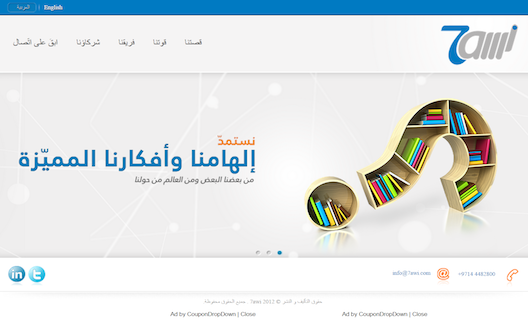7awi’s lessons from launching 5 Arabic sites in 2 years


The virtual world suffers a severe shortage of Arabic content;
sites in Arabic account for only 3% of all online content. In
recent years, there have been initiatives in several countries to
develop a production pipeline for Arabic content, especially since
demand is rising among an increasingly web literate population. As
more content is produced, diversity becomes an issue: this is the
problem 7awi
tackles.
7awi CEO Anas
Abbar, known as Andy, tells us that “two years ago, Waseet,
which owns several Arabic magazines, decided to go digital… They
asked me to found 7awi, a sister company that would focus on
digital Arabic content,” he says.
Today, 7awi’s family includes five unique websites that each
addresses the interests and preferences of readers in the MENA
region, including Layalina,
7awi’s first product, launched in November 2012. Prior to 2012,
most websites in Arabic were forums, in the style of many early
websites in English and other languages; Layalina was one of the
first Arabic sites to produce articles, photo essays, and other
content with which readers could interact. “The printed magazine
wasn’t available in all of the Middle East. However, the website
allowed us to build relationships with readers throughout the Arab
world, from the Maghreb to the Gulf, who could now share news and
comments.”
Arab Turbo was launched
in August 2013 for news about cars and engines, followed by
Waseet in February 2013,
the transactions portal and markets guide, considered to be the
core product in 7awi’s portfolio, according to Abbar.
This year, the company launched AlQiyadi, a website targeted at men
which features news on business, fashion, technology, and
lifestyle. “Sixty percent of people in the Arab world are men under
the age of thirty. And with the increase of internet and mobile
penetration rates, demand on websites has grown.” Another recent
launch is Ra2ej, launched last
Ramadan which publishes funny news and viral images and videos.
Abbar says that it is like the Arab world’s BuzzFeed and that the company is
considering allowing readers to contribute to the website by
uploading images and videos.

7awi’s office space in Dubai.
Abbar believes that 7awi’s focus on technology has played an
important role in its success (he declines to share metrics of how
well the company is doing). “80% of visits are via mobile. That is
why we tend to focus on the latest technologies in terms of apps
and interfaces. We’re even considering the possibility of making
Layalina, for instance, available on Smart TV.”
Abbar also stresses the importance of user experience. “What
happens backstage, i.e. technologies used and user experience” are
essential to the success of websites; however, what’s more
important is to win readers’ trust with quality Arabic content that
will make them come back again and again. “We focus on the way of
writing, choice of headlines, as well as on updating news and
content directly and quickly,” explains Abbar.
Despite what seems like a carefully calibrated strategy, 7awi
has had its share of challenges along the way, the most important
of which Abbar believes to be finding talent in the region and
collaborating with companies. He told us that collaboration and
partnership with global corporations such as MSN is easier than
with other regional companies due to a lack of proper awareness and
education.
Abbar thinks that the region still needs time, given its large
size and the fact that each country – and even each city – differs
a lot demographically from one to another. “We need time to change
prevailing mentalities. Because of this diversity, it was very
important for us to integrate and link all of 7awi’s websites to
meet the various needs of Arab readers, in an attempt to benefit
from all opportunities we could to keep 7awi in the lead in any
experience it undergoes.”
To win the long game, 7awi no longer focuses on launching new
websites, but rather on improving its existing ones: “Our goal is
for our websites to rank first only one year after their
launch.”

Leave a Reply